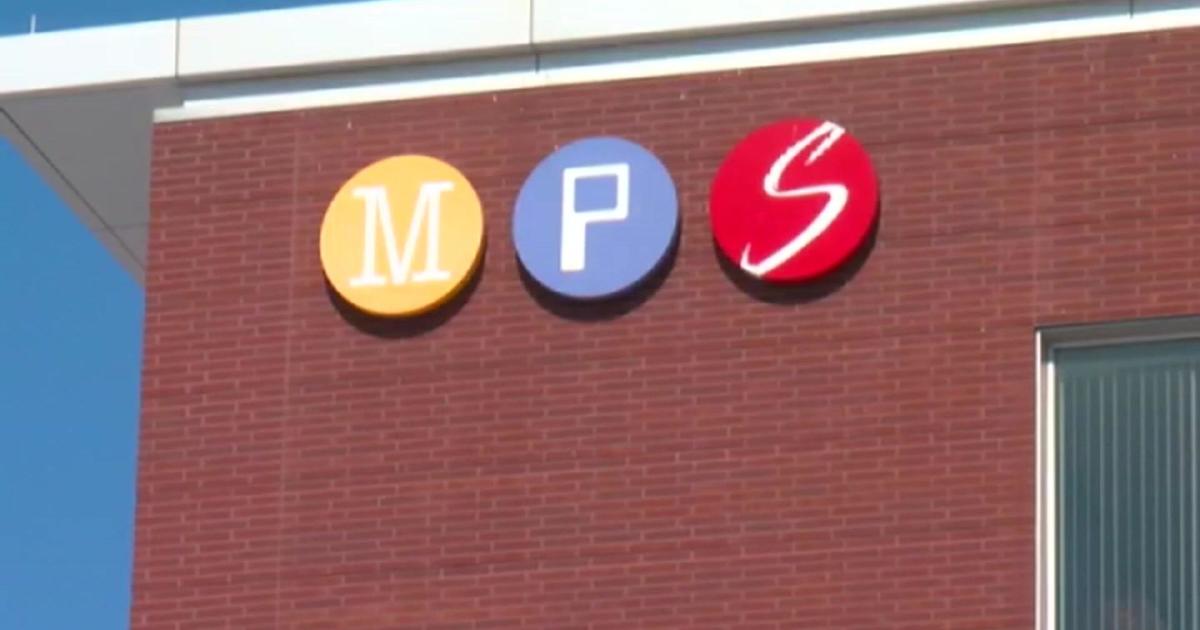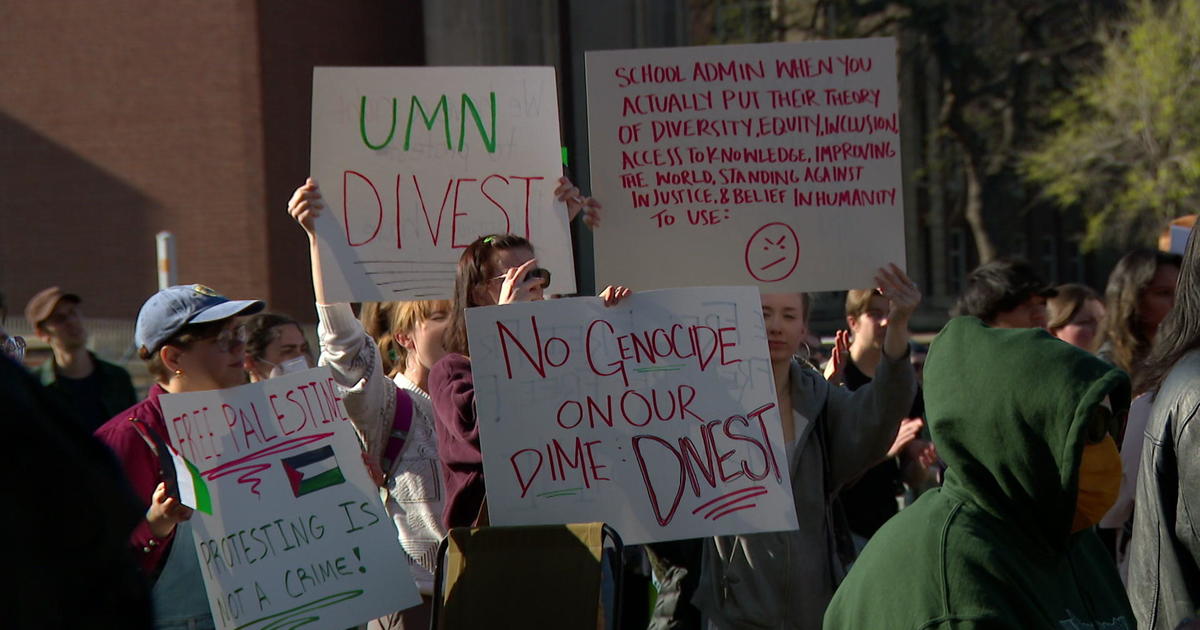Minnesota Labor Unions Divided Over The Green New Deal
MINNEAPOLIS (AP) — Two national leaders of the Service Employees International Union recently came to St. Paul to talk about the union's latest initiative to fight climate change: the Green New Deal.
Earlier this summer, the SEIU executive board passed a resolution endorsing the sweeping measure proposed by Democrats in Congress, and the union has since worked to educate its 2 million members about the effort to slow global warming.
The endorsement is notable. Despite the Green New Deal's popularity with progressive leaders and several Democratic presidential candidates, the SEIU is by far the largest union to support the proposal, which includes a broad set of climate, energy and economic promises. Many unions — especially those representing workers in construction, manufacturing and trades — have been hesitant to back such a massive change to the nation's energy grid and economy, worrying it's a political impossibility or that it will lead to unnecessary job losses in industries that employ a lot of union workers.
___
The nonprofit news outlet MinnPost provided this article to The Associated Press through a collaboration with Institute for Nonprofit News.
___
That split extends to several aspects of climate policy, including a schism that is playing out in Minnesota over whether to build Enbridge's Line 3 project. Most unions have sided with Republicans and a contingent of centrist DFLers who support the oil pipeline over environmental advocates and progressive Democrats who oppose it.
Luisa Blue, an executive vice president for SEIU, and Jon Barton, a climate program leader at the union, told MinnPost the union's support for the Green New Deal is based on pragmatic concerns as much as politics: members face the adverse effects of climate change every day, and endorsing its goals is a way to help labor groups shape the transition away from fossil fuels and shield low-income workers from the pollution and natural disasters fueled by a warming planet.
"It's an economy-changing initiative that leads with climate, racial and economic justice," Barton said. "Within that, we see a big piece of our role is to ensure there is a voice for working people and a voice for labor."
SEIU is not typically in the middle of political fights over energy policy. The union represents service workers, such as hospital and nursing home employees, janitors and school food staff. Its largest branch in Minnesota is made up of health care workers.
Scientists say natural disasters are becoming stronger and more common as the planet warms, and Blue and Barton said their members are often on the front lines; they've had workers whose homes are burned down by California wildfires and flooded by hurricanes in the South. Other problems, such as asthma caused by industrial facilities, also affect their members, the SEIU leaders said, while health care and service workers are often called upon to help those affected by disasters.
"Science is on our side," Blue said. She noted the union was particularly inspired by the youth-led anti-climate change Sunrise Movement to make climate change and the Green New Deal a bigger part of their advocacy push. During Barton and Blue's visit to St. Paul on Thursday, SEIU Healthcare hosted a group of teenagers who were planning a local school walkout to call for government action to address climate change.
For now, the Green New Deal is only a non-binding resolution in Congress. But it calls for a "10-year-mobilization" to lower carbon-emissions in the country to zero through spending on the country's energy grid, transportation sector, infrastructure and housing upgrades. The deal says it will create millions of "good, high-wage jobs" and also calls for universal health care and housing.
Many Republicans and some Democrats have been skeptical of the feasibility and cost of such an undertaking, however. Opponents of the Green New Deal often cite a study by a conservative think tank that said it would cost between $51 trillion and $93 trillion by 2090.
But the study's author has said he could not accurately guess the price tag since the Green New Deal contains broad policy goals, rather than concrete proposals. An energy research company, however, has estimated it would take $4.5 trillion to decarbonize the country's power grid.
Sen. Bernie Sanders recently released his own $16.3 trillion version of the Green New Deal that would convert the country's energy and transportation sectors to run on renewable energy by 2030.
Before Sanders' proposal, the SEIU passed a resolution saying the Green New Deal concept "aligns with our values and presents an unprecedented opportunity to unite the fights for environmental, racial and economic justice and make inclusive prosperity and economic security available to all of us by calling for a fundamental reshaping of our economy."
To push the Green New Deal, Blue said SEIU will participate in climate town halls around the country. Barton noted the union has let House Speaker Nancy Pelosi and Senate Minority Leader Chuck Schumer know "the labor movement is not monolithic right now on this issue." They've also talked to some presidential candidates, including former Vice President Joe Biden, Barton said.
In some ways, there is broad agreement among unions in Minnesota on climate change policy, particularly about the need to invest in green technology and the jobs that come with it.
Emil Ramirez, director of the United Steelworkers District 11 based in Minnesota, said climate change "requires bold and immediate action" that "will ultimately result in a net gain of jobs and have an overall positive impact on our economy."
The United Steelworkers, which in Minnesota represents thousands of miners and other workers, is a founding member of the BlueGreen Alliance, an organization that brings together unions and environmental advocates such as the Sierra Club.
The alliance calls for rapid reductions in greenhouse gasses and says America must commit to reducing its emissions to net zero by 2050, meet the country's pledges in the Paris climate agreement and make "massive" investments in energy efficiency and clean and renewable technology, according to a fact-sheet of its priorities. The organization was on a Q&A panel hosted by Barton and Blue at SEIU in St. Paul on Friday.
The Local 160 of the International Brotherhood of Electrical Workers and the Minnesota and North Dakota chapter of the Laborer's International Union have intervened at the state Legislature to push for regulations that would make building fossil-fuel projects more difficult, a policy under debate known as "clean energy first," and most Republicans and Democrats appear to support some form of the measure.
LIUNA has fought for the bill to include a preference for renewable energy developers to hire local workers and IBEW says it wants the proposal to include nuclear energy as a "clean energy" worth continuing at existing operations in the state. LIUNA has also endorsed Gov. Tim Walz's plan to make the state's energy grid carbon-free by 2050.
Jessica Looman, executive director of the Minnesota State Building and Construction Trades Council, a federation of unions that represent 70,000 workers, including IBEW and LIUNA, said "we absolutely agree that climate change has to be addressed."
"The position that we've been taking all along is supporting investments in solar, wind, nuclear, hydro, carbon capture, battery storage, transportation transit — all of the spaces that we actually have a direct impact on because our members build that infrastructure," Looman said.
Still, those unions — or their national counterparts — have stopped short of endorsing the Green New Deal and have not always sided with environmental advocates.
Looman said her council is trying to navigate the tension between "what we aspire to achieve and how we actually continue to operationalize and engage in the day-to-day activities of our economy."
The Building Trades council represents workers that could build the Line 3 oil pipeline and has supported Line 3 and does not want to undermine workers in the fossil fuel industry while the state is still reliant on them. Looman said Minnesota needs energy that is "reliable, accessible, affordable, safe, stable, efficient" — things that she says renewable energy alone can't yet accomplish.
The Green New Deal, she said, could limit the state's ability to deliver current infrastructure and energy needs for the sake of aspirational goals for the future.
Looman referenced a March letter to Green New Deal sponsors from the AFL-CIO, the largest federation of unions in the U.S. It argues in support of natural gas as a bridge between coal and renewables and says labor leaders want to "engage on climate issues" without impinging on other priorities, namely an infrastructure package. (Many clean-energy advocates argue whether greenhouse gas emissions from natural gas and its methane leaks is an acceptable alternative to coal.)
"We welcome the call for labor rights and dialogue with labor, but the Green New Deal is far too short on specific solutions that speak to the jobs of our members and the critical sectors of our economy," says the letter, which is signed by IBEW, the Steelworkers, LIUNA North America and a host of other unions.
Kevin Pranis, a spokesman for LIUNA North Dakota and Minnesota, said the debate over a Green New Deal is divisive and could delay quick and practical action to aggressively cut carbon emissions. He said Minnesota's "clean energy first," Walz's carbon-free energy plan, and a slate of infrastructure investments, are achievable and should be the focus in Minnesota.
While construction unions sometimes stand in opposition to climate advocates on the Green New Deal or Line 3, Pranis pushed back on the notion that they're slowing down action on global warming.
For example, Pranis said LIUNA and others have accepted job losses in worker-intensive coal plants even though he said wind and solar don't require as much work to upkeep. LIUNA signed an agreement with environmental organizations that supports a plan for Xcel Energy to retire two coal plants early. The utility plans to end use of coal in the state by 2030 and have carbon-free energy by 2050.
"Nobody has leaned into this harder than we have," Pranis said.
Perhaps no fight over climate policy in Minnesota has been more contentious than the Line 3 debate — and more frustrating to Pranis and other unions. Enbridge wants to build 337 miles of pipeline in Minnesota for the $2.6 billion project to replace a 1960s-era pipeline that is corroding and operating at half capacity. State regulators on the DFL-controlled Public Utilities Commission have said it should be built to cut the risk of leaks, while environmental groups like the Sierra Club and several tribes argue long-term fossil fuel infrastructure must be stopped.
Pranis said without the pipeline, Enbridge could just move its oil by rail instead. The spike in oil trains during North Dakota's oil boom is evidence, he said. When environmental groups oppose jobs for something he believes won't contribute to climate change, and may help prevent spills or oil train explosions, it strains tensions with labor, Pranis said.
"It is a giant waste of people's time in terms of addressing climate," he said. "There are so many things we can do that have real impacts on climate that would make sense."
Barton, the SEIU deputy director, did not take a stance on Line 3 or wade into other local environmental debates. But he said the Green New Deal — which calls for an end to greenhouse gas emissions as fast as "technically feasible" — will create millions of new jobs if implemented. That, he said, should spark labor support.
"Some trades and others would say there's going to be enormous loss," he said. "They're making a transition from one type of job to another, but it wouldn't be a net loss."



